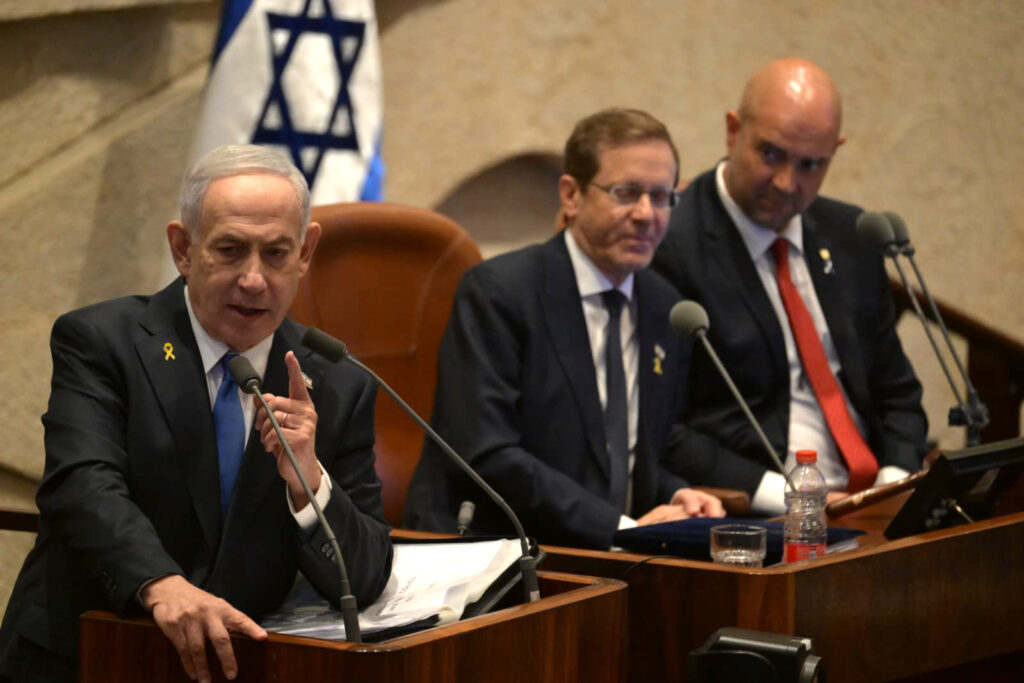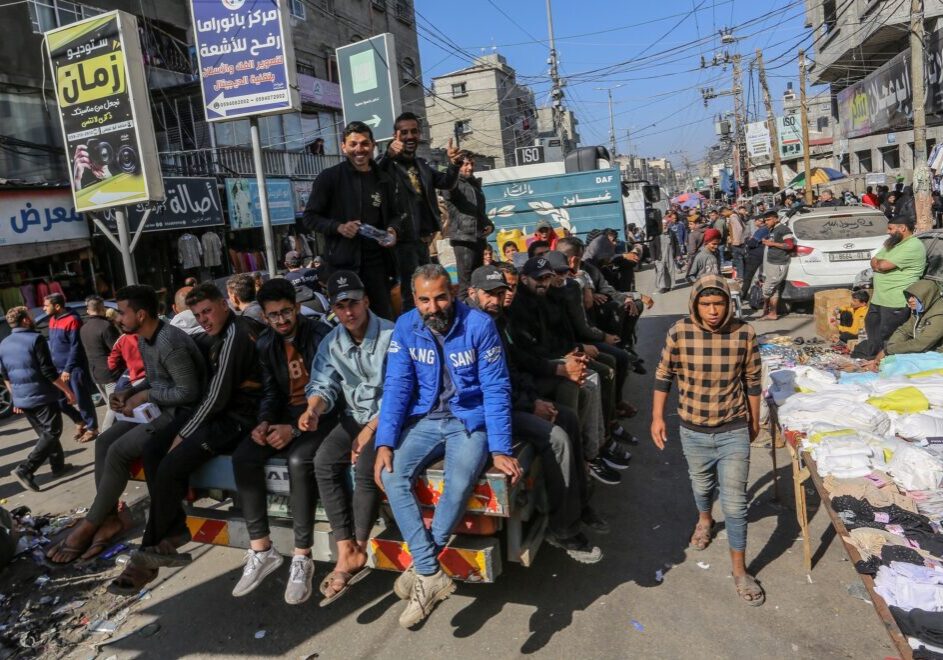FRESH AIR
In the wake of the Gaza ceasefire, Israel’s election countdown begins
October 30, 2025 | Ilan Evyatar

The 20 remaining live Israeli hostages held by Hamas in Gaza returned home on October 13, symbolically arriving just before the second anniversary of the Simchat Torah holiday. On the Hebrew calendar, that’s the day they were taken, as Hamas forces invaded Israel and massacred 1,200 people, on October 7, 2023.
While only some of the remains of slain captives have so far been returned as demanded under the 20-point Trump ceasefire plan, Israel’s focus is now very much on the “Day After”, not just in Gaza, but also at home.
The next Israeli elections are not officially scheduled until late October 2026, yet the campaign season has plainly begun. The Knesset’s winter session opened on Oct. 20 with an acrimonious debate, reflecting a political system already in election mode.
Knesset Speaker Amir Ohana sparked uproar when he referred to Supreme Court President Yitzhak Amit merely as a “judge”, having snubbed him during US President Trump’s address to the Knesset the previous week. Attorney-General Gali Baharav-Miara was excluded from both events – a further sign that the coalition’s campaign to push through controversial judicial reforms is far from over.
Ohana’s remarks drew howls from the opposition and an unusually forceful rebuke from President Isaac Herzog, who declared he would “speak up for Israeli judges” against “impoliteness and personal attacks.”
The Herzog-Ohana clash was just the appetizer however. After their spat, Prime Minister Binyamin Netanyahu and Opposition Leader Yair Lapid traded accusations from the dais.
The Prime Minister played up Israel’s achievements in the war with Iran, the strength of the economy and the potential for expanding the Abraham Accords, adding that Israel would have “gone up in nuclear smoke” had he heeded the opposition’s calls to end the war with Hamas and agree to its “terms of surrender” before striking Teheran’s nuclear program.
Lapid hit back, saying, “Mr Prime Minister, I listened very attentively to your speech and wondered what reality it was taking place in… Who was prime minister on October 7? The opposition?… Who was the prime minister when Iran amassed its power?… Who was the prime minister when Hezbollah amassed 150,000 missiles?”
The battle lines for Israel’s next election have been drawn.
For Netanyahu, the months ahead will likely be about attempting to rewrite the narrative. He must shift public attention from the failures of October 7 to the triumphs of the Iran war, the decapitation of Hezbollah’s leadership, and the promise of new normalisation deals with Arab neighbours. His immediate objectives are to push through a draft law to resolve the controversy over ultra-Orthodox (“Haredi”) enlistment in the IDF, steer the second phase of the Trump peace plan for Gaza through and expand the Abraham Accords, all without being cornered into terms that would fracture his coalition and alienate his base.
Just how hard that balancing act may prove to be was illustrated when hard-right Finance Minister Bezalel Smotrich commented that if Saudi Arabia offers Israel normalisation in exchange for a Palestinian state, then Jerusalem should turn down the offer and let the Saudis “keep riding camels in the desert.”
Saudi Crown Prince Mohammed bin Salman is scheduled to visit the White House on Nov. 18, with reports claiming that United States President Donald Trump will be pushing Saudi-Israeli normalisation. Sources with access to the Saudi court have however intimated that the kingdom would prefer to wait for “a new Israeli government” before signing any agreement – translated into Israeli political parlance, “Just Not Bibi”.
Smotrich’s bluster may play well to the hard-right where he is engaged in a battle for political survival, with polls showing his party likely ending up below the threshold to get into the Knesset. However, the comments also underscore why Netanyahu’s diplomatic ambitions are at odds with his coalition’s domestic politics.
Rewriting the Rules
With Smotrich languishing below the threshold, the Finance Minister’s Religious Zionist Party colleague, Knesset Constitution Committee chairman Simcha Rothman, has proposed a legislative reform package combining a lower electoral threshold to enter the Knesset and a surplus-vote bloc law. These moves would keep votes cast for small parties inside the tent even if they fall short – so a sizeable number of votes for the right-wing bloc would thus still count even if Smotrich’s party doesn’t make it across the line.
To push forward the laws, Rothman met with Ayman Odeh, the leader of the primarily Arab Hadash-Ta’al bloc – whom he has previously accused of “collaborating with the enemy” and has moved to oust from Parliament. In justifying the meeting, Rothman declared that he was obliged to look after the interests of all members of the Knesset. Odeh, whose party is also in danger of falling short of the electoral threshold, described the proposal as “a serious issue that deserves discussion within our party.”
Meanwhile, the Government’s ability to see out its term – Netanyahu is believed to want to stay the course at least until the middle of next year – is heavily dependent on a resolution of the Haredi draft issue, which has paralyzed parliamentary work and left the coalition without a working majority. Shas, one of the two ultra-Orthodox parties, announced on Oct. 23 that it would withdraw from its Knesset committee posts in protest over the Government’s failure to legislate new draft exemptions for yeshiva (religious school) students. The other, United Torah Judaism, is threatening to follow suit.
The proposed “draft law” being floated by the Prime Minister’s Office would require some 10,000 Haredim to be conscripted over the next two years, and establish a target of enlisting half of each annual Haredi conscription cohort as they turn 18 into the IDF within five years. The current exemption age for the draft would remain 26. Yeshivas that fail to meet recruitment targets would see funding reduced, but penalties on individuals who evade the draft would be delayed. To the ultra-Orthodox parties, even this compromise goes too far and a “million-person rally” was called for Oct. 30 to protest the arrest of Haredi deserters and the “persecution of Torah scholars.”
Opposition Leader Lapid responded by stating that he would seek to pass a law revoking the right to vote from ultra-Orthodox men who avoid the draft. Avigdor Lieberman, chairman of the secularist Yisrael Beitenu party, welcomed the call, adding that draft dodgers should be given a criminal record. However, Blue and White chairman Benny Gantz, running on a moderate centrist ticket, described the proposal as a “step too far”.
Former prime minister Naftali Bennett has also been scathing in his criticism of the proposed draft law and while he is currently not a member of Knesset, he is expected to make a return to politics at the next election and to pose the most significant challenge to Netanyahu.
The latest survey from Israeli public broadcaster Kan, released on Oct. 26, puts a party led by Bennett on 21 Knesset seats, behind Likud, which remains the largest party with 27 seats. However, despite Likud showing improved polling since the Gaza ceasefire, the pro-Netanyahu bloc still musters only 51 out of the Knesset’s 120 seats, compared to 59 for a Bennett-led bloc consisting of a variety of parties opposed to Netanyahu. Two predominantly Arab parties would score the remaining ten seats.
Former PM Bennett has been quietly preparing his return for months. In a closed-door forum leaked to the media, Bennett outlined a strategy for building what he calls a “Zionist-liberal bloc” capable of defeating Netanyahu without relying on the Arab parties for a majority. His pitch targets the disillusioned centre-right – traditional Likud voters from the geographic and ideological middle who want security hawks, but not extremists.
“My positions are hawkish on security, but I’m liberal,” Bennett told the forum. “When you give voters an alternative – someone who was a good prime minister, who is right-wing but won’t establish a Palestinian state – they’ll want to support him. In a race between Bennett and Netanyahu, once that’s the matchup, we know we can win.”
That’s actually far from certain, but the current Government is nonetheless advancing legislation that would forbid any politician from launching a new political party within seven years of dissolving a previous one unless its debts are paid in full. The measure is widely seen as tailor-made to hobble Bennett’s comeback bid, given the unpaid millions still owed by the defunct Yamina and Jewish Home parties he once headed. Bennett called it a personal, anti-democratic law born of fear, insisting it would be struck down the moment it reached the courts.
Looming in the background as it has for the past four Israeli elections is Netanyahu’s ongoing corruption trial. President Trump brought up the subject in his Knesset speech on Oct. 14, when he called for the trial to be cancelled – much to the obvious chagrin of Israeli President Isaac Herzog, who was standing near Trump on the dais. “A few cigars and some champagne, who cares” Trump asked rhetorically – referring to gifts that are at the centre of one of three charges Netanyahu faces. Israeli Trump watchers parsed the tea leaves to divine whether the President’s comment and his effusive praise of Opposition Leader Lapid – who he called a “nice guy” – were meant to pave the way for a coalition that would sideline Netanyahu’s current far-right partners and allow him to make progress on expanding the Abraham Accords.
Just in case, MK Limor Son Har-Melech of the far-right Otzma Yehudit party – a member of Netanyahu’s coalition – put forward a bill that would allow the Knesset House Committee to suspend the criminal trial of a sitting prime minister. The proposal drew a blistering response from Attorney-General Baharav-Miara, who called it unconstitutional and “tailor-made to absolve an individual of justice.”
Netanyahu publicly opposed applying it to his own case, and the bill was shelved. Still, its appearance reminded voters that the Prime Minister’s legal troubles remain unresolved – and that the questions of accountability, personal and institutional, continue to haunt Israeli politics.
Four days earlier, on Oct. 22, the Knesset State Control Committee rejected the opposition’s call for a full state commission of inquiry into October 7, opting instead to push for a government-appointed review panel.
The distinction is not semantic. A state commission – established under the Commissions of Inquiry Law and chaired by a retired Supreme Court justice – has subpoena power, judicial authority, and independence from the government. A governmental panel, by contrast, reports to the same political echelon it is meant to examine, and its recommendations carry no binding force. For bereaved families and much of the Israeli public, that difference is seen as fundamental to the credibility of the result.
Opposition members accused the coalition of trying to shield the Prime Minister and senior officials from testimony under oath; coalition members countered that a formal state commission would only paralyze security institutions and inflame political divisions.
How all this will play out at the ballot box next year remains to be seen.
Tags: Israel, Israeli politics
RELATED ARTICLES

He survived Bondi. Now he’s fighting back: Arsen Ostrovsky addresses AIPAC conference

US Middle East strategy amid regional instability: Dana Stroul at the Sydney Institute





















